Olympics on a shoestring - Great Britain at Atlanta 1996
The 1996 Olympic campaign was the last one Team GB undertook without lottery money. However, while that made them less successful than recent years, they were no less colourful, then coach Doug Dailey tells Vern Pitt

The latest race content, interviews, features, reviews and expert buying guides, direct to your inbox!
You are now subscribed
Your newsletter sign-up was successful
The soundtrack to the summer of 1996 was unquestionably ‘Wannabe’, the infectious pop smash hit that catapulted the Spice Girls into the British and international consciousness. It, along with Oasis’s ‘Wonderwall’, heralded the start of new era, Britpop, where an all-conquering cohort of Brits would take the music scene at home and abroad by storm.
Lines like “Get your act together we could be just fine,” could have been aimed at the British cycling scene, which was on the verge of experiencing a similar journey to world domination – albeit at a slower rate. But for that summer, as the countdown began for the Atlanta Olympics, the old order still reigned.
The sport was short on money and compromises had to be made in the build- up – even a Rolling Stone was tapped up to help finance the trip. It was the last Olympic cycle they would undertake on a shoestring budget. Lottery funding came in the following year and British Cycling’s march – Union Jack miniskirt not included – to world domination would follow. But for now things were very much done on the cheap.
Central to making the most of that on the road to Atlanta was Doug Dailey, head coach of the British team for the previous 10 years and a professional racer himself before that. He was a central figure in the running of the elite programme, such as it was, and despite retiring after the 1996 Games, would go on to return in a logistics role for every Olympics up to 2008.
Getting a team qualified and ready for the 1996 Olympic Games had been anything but straightforward. The sport was moving to the ‘open era’ where pros and amateurs would compete on equal terms – an effort to ensure the riders at the Olympics really were the world’s best.
Prior to that, Dailey had been able to take “as many riders as the British Olympic Association [BOA] could afford”. He says: “The UCI [Union Cycliste Internationale] had set up a qualification process, so that there was a real quality control exercise. And that’s why our team was relatively small. There were events that we had no competitors in at all, which was different to previous Games.”
The bulk of that qualification took place at the 1995 World Championships in Bogota and Duitama, Colombia. The only hitch for the Brits making the trip was that both cities are at over 8,000ft in altitude. “What a nightmare,” recalls Dailey. “We had to use a lot of imagination to get a decent team, the best team we could afford, out to Colombia.”
The latest race content, interviews, features, reviews and expert buying guides, direct to your inbox!
Read the full article in the current issue of Cycling Weekly magazine. Subscribe and get six issues for just six pounds. Also in this issue: Alan Newton, Britain's oldest living Olympic medalist, riders recall their Games memories, riders family watching Rio success on the television and the last time the Games went to Tokyo.
Having trained as a journalist at Cardiff University I spent eight years working as a business journalist covering everything from social care, to construction to the legal profession and riding my bike at the weekends and evenings. When a friend told me Cycling Weekly was looking for a news editor, I didn't give myself much chance of landing the role, but I did and joined the publication in 2016. Since then I've covered Tours de France, World Championships, hour records, spring classics and races in the Middle East. On top of that, since becoming features editor in 2017 I've also been lucky enough to get myself sent to ride my bike for magazine pieces in Portugal and across the UK. They've all been fun but I have an enduring passion for covering the national track championships. It might not be the most glamorous but it's got a real community feeling to it.